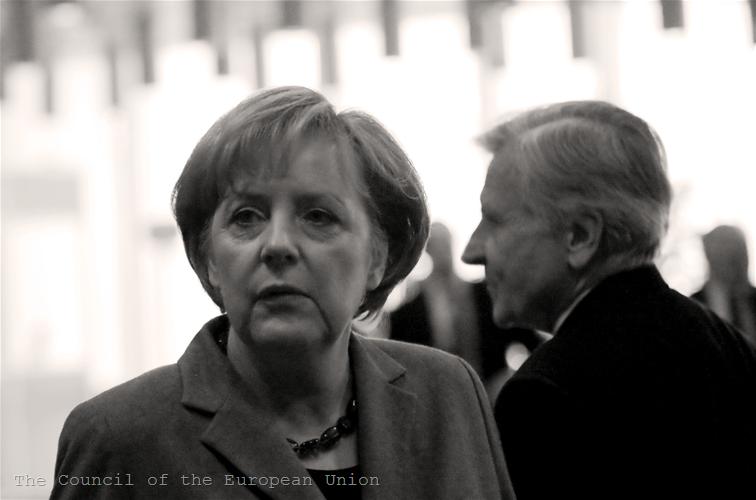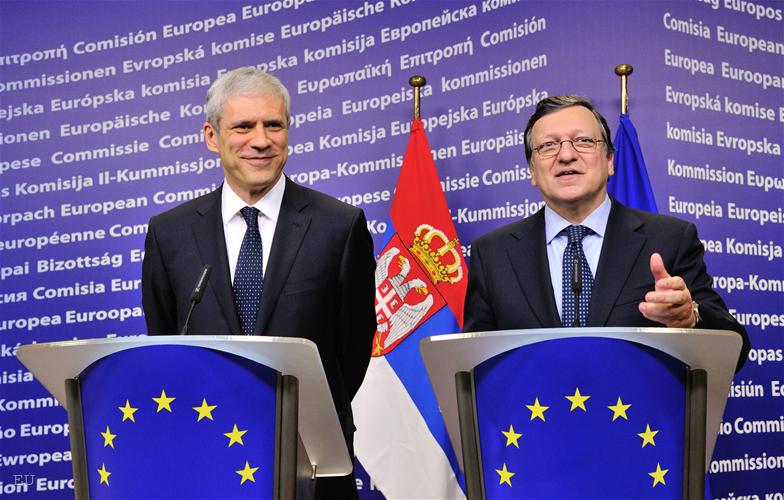The European Leaders Revive the Euro Plus Pact
Ralitsa Kovacheva, March 1, 2012
 The menu for the working dinner of the EU leaders, gathered for their regular spring meeting in Brussels, includes the European semester as main course, garnished with the Euro Plus Pact and a little bit of Schengen and Serbia for dessert. Economic and fiscal convergence, however, is the natural number one topic of the evening, moreover given that for breakfast on Friday morning will be the signing of the Treaty on the stability in the euro area, also known as the fiscal pact.
The menu for the working dinner of the EU leaders, gathered for their regular spring meeting in Brussels, includes the European semester as main course, garnished with the Euro Plus Pact and a little bit of Schengen and Serbia for dessert. Economic and fiscal convergence, however, is the natural number one topic of the evening, moreover given that for breakfast on Friday morning will be the signing of the Treaty on the stability in the euro area, also known as the fiscal pact.
"This meeting of the European Council must serve to identify the priorities
Member States should focus on at the national level," according to the invitation, sent to the leaders by European Council President Herman Van Rompuy. At their meeting in January, the EU finance ministers concluded that "focus should be put on measures supporting short term growth within the overall framework of fiscal consolidation." The ministers stressed that despite the need for initiatives at European level "it is first and foremost up to individual Members States to deliver on the agreed consolidation and reforms " in their forthcoming National Reform Programmes (NRP), Stability Programmes (SP - for euro area countries) and Convergence Programmes (CP - for countries outside the euro area).
In this sense, the finance ministers recall that under the Euro Plus Pact countries have been committed to implement reforms to promote competitiveness and employment and to support the sustainability of public finances and financial stability. In June 2011, the EU leaders recognised that countries, participating in the Pact, had proposed over 100 individual measures, but recommended that those measures become more concrete and be applied in a more ambitious way. At the European Council in December 2011 the leaders again pledged more specific and measurable actions at national level.
"As part of the European Semester, Euro Plus Pact commitments should be thoroughly assessed and any remaining implementation gap should be identified," EU finance ministers state in the conclusions from their meeting on 21 February. In order to be assessed by the Council and the Commission in the framework of the semester, the commitments under the Euro Plus Pact must be reflected in the national reform programmes and the stability programmes (convergence programmes). Countries should focus on a small number of essential reforms, the finance ministers recommend. Progress will be reported in June 2012.
"Work on the structured discussions on the coordination of tax policy issues under the Euro Plus Pact will be further pursued focusing on areas where more ambitious activities can be envisaged. Particular attention should be paid to how tax policy can support economic policy coordination and contribute to fiscal consolidation and growth."
In their conclusions from the December European Council the leaders clearly bind the Euro Plus Pact with the newly agreed fiscal compact. In the first versions of the intergovernmental agreement there was a reference to the Euro Plus Pact in its part concerning convergence of economic policies. Subsequently, the direct reference was removed – according to Bulgaria's Finance Minister Simeon Djankov, after an explicit request from  Sofia. However, the preamble of the treaty recalls the commitment of the countries under the Euro Plus Pact, "which identifies the issues that are essential to fostering competitiveness in the euro area."
Sofia. However, the preamble of the treaty recalls the commitment of the countries under the Euro Plus Pact, "which identifies the issues that are essential to fostering competitiveness in the euro area."
All this shows that the Euro Plus Pact, although not a focus of attention in recent months, is not "outdated", as Bulgarian Finance Minister Simeon Djankov claims. On the contrary – putting this in essence political agreement in the framework of the European Semester is a clear indication that concrete implementation of commitments will be pursued. And this is quite understandable. Although, according to the Bulgarian finance minister the Euro Plus Pact was irrelevant because it had been replaced by the fiscal compact, the statement of ECOFIN makes it clear that budgetary consolidation (the fiscal compact) should be complemented by reforms, moreover essential ones (described in the the Euro Plus Pact). This applies to all member states, but particularly to those who had demonstrated stronger commitment to deliver more, which was precisely the idea behind the Euro Plus Pact .
In this sense, the official Bulgarian position for the EU summit on 1 and 2 March has nothing in common with the finance minister`s scepticism. "Bulgaria declares that it strictly fulfils its commitments under the Euro Plus Pact, which are defined in details in the National Reform Programme (2011-2015) and the Convergence Programme (2011-2014)." As usual, on the issue of tax policy coordination "Bulgaria reiterates that direct taxation remains a national competence."
In the Convergence Programme it is only noted that "the policies presented in the programme to further increase sustainability of public finances, and policies to promote economic competitiveness, also address the objectives of the so-called "Pact for the Euro Plus." The National Reform Programme (2011-2015) contains a separate chapter, where the country's commitments under the pact are listed. However, they sound too vague and wishful and in places even puzzling. For example, in terms of wages the programme states that "except the minimum thresholds, which are updated every year, the level of wages is determined by market principles." This, however, does not correspond to the conclusion in the European Commission report on macroeconomic imbalances. It states that "Bulgaria shows one of the highest rises in ULC [Unit Labour Costs] in the EU", which could reduce the competitiveness of the economy.
 The Bulgarian example is not an exception, as is shown by the statements of the European leaders and finance ministers. But the message is clear: if the countries have joined the pact spontaneously and without a clear vision of what they were getting involved into, as Bulgaria did, it is their problem. They are expected to make concrete and measurable actions with real results.
The Bulgarian example is not an exception, as is shown by the statements of the European leaders and finance ministers. But the message is clear: if the countries have joined the pact spontaneously and without a clear vision of what they were getting involved into, as Bulgaria did, it is their problem. They are expected to make concrete and measurable actions with real results.
 | © The Council of the European Union
| © The Council of the European Union | © The Council of the European Union
| © The Council of the European Union | © European Union
| © European Union | © euinside
| © euinside | © EU
| © EU | © EU
| © EU